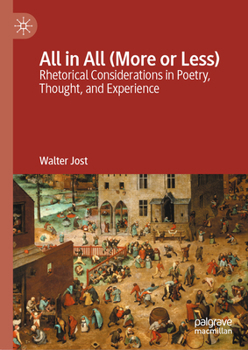All in All (More or Less): Rhetorical Considerations in Poetry, Thought, and Experience
This book reinvents aspects of the rhetorical tradition as part of a philosophical pluralism oriented to "All-in-Allness". Its chapters unfold some of the ethical and intellectual responsibilities philosophy and rhetoric share, their commitments toward literature broadly conceived, the limited authority of their interpretations, and the kinds of judgments they issue in. Part One, drawing chiefly on Ludwig Wittgenstein and Richard McKeon, leverages...
Format:Hardcover
Language:English
ISBN:3031562992
ISBN13:9783031562990
Release Date:February 2025
Publisher:Palgrave MacMillan
Length:693 Pages
Customer Reviews
0 rating





